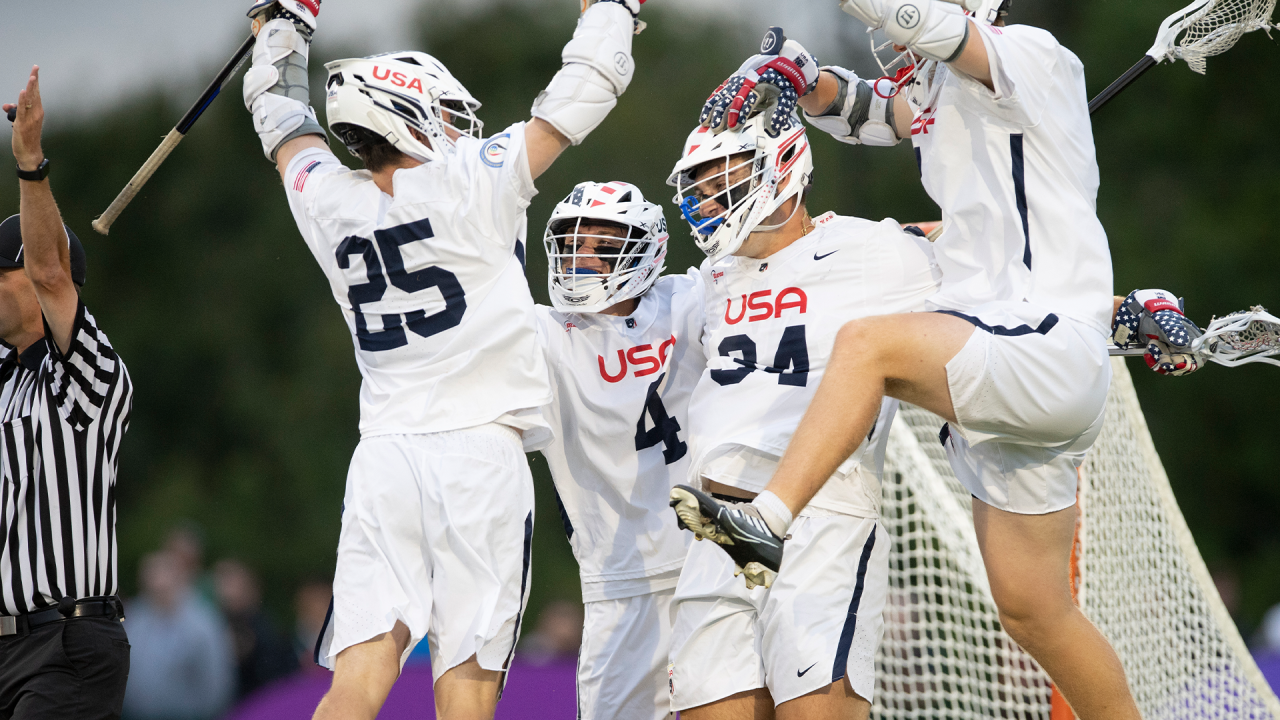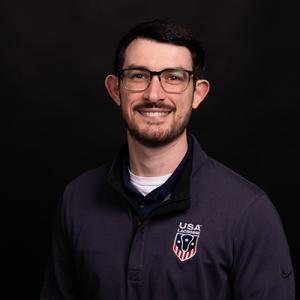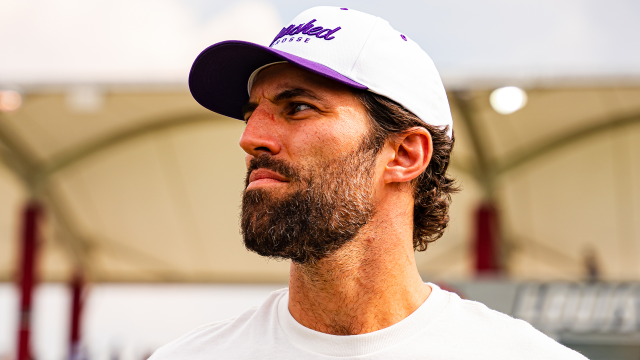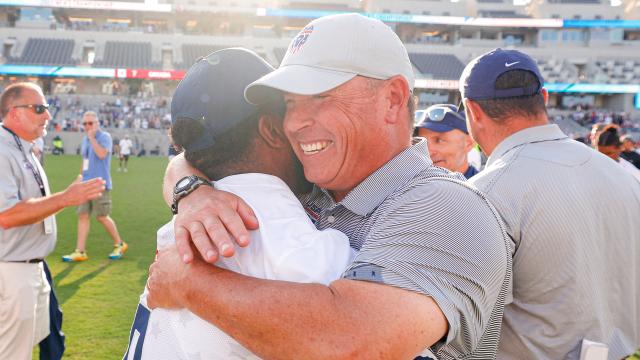

© 2026 USA Lacrosse. All Rights Reserved.

Graham Bundy Jr. rocked back onto his right heel and smirked. He looked down at the once-pristine grass field at the University of Limerick, tarnished and browned after 11 days of lacrosse.
“These are the ones,” the midfielder said, pointing at his cleats.
Bundy wears a size 12 “on a good day” but played the entire World Lacrosse Men’s U21 Championship in Limerick, Ireland, wearing 13s. With literal big shoes to fill, Bundy and the U21 team set out to fill the metaphorical big shoes of a U.S. program that had won a gold medal in every junior men’s competition since the tournament’s inception in 1988.
“They didn’t really fit anyone,” Bundy said. “I grabbed them just because this is a once-in-a-lifetime opportunity, and it was USA gear left on a table that no one wanted. I was the last one to leave the locker room and they were still there. Fortunately, my feet are pretty wide and Nikes run pretty small, so it ended up working out.”
Voted a captain by his teammates along with Cole Kirst, Bundy leaving the locker room last became something of a theme. During the first tryout in June 2019, Bundy stayed late to clean up the empty bottles and tape that the 110 hopefuls left behind. It earned the respect of his coaches and peers.
Head coach Nick Myers preaches a lot about character. It’s the beginning, middle and end of every huddle, meeting and casual conversation. Bundy embodied that.
“Trying out, the coaches said, ‘We’re picking the right 23,’” Bundy said. “To me, the right 23 are the guys who do those things. There are so many talented kids out there that there’s not much that separates them on the field. You have to do those things that are unseen at the time, but someone will get a glimpse and it’ll pay off.”
Throughout a three-year process that got sidetracked by the COVID-19 pandemic, the tournament classification changed from U19 to U20 to U21. While the roster underwent a few facelifts during that time — namely tournament MVP CJ Kirst being added to the team in July — the character stayed the same.
Myers is a fan of tenets. He has a credo for every occasion. “Humble warrior” is one of them. His goal was to build a team of 23 players willing to do anything necessary to win or get an edge. Diving to end lines, setting hard picks and racing opponents to the substitution box all made the usually stoic coach crack a smile.
In the gold medal game, a contest during which Canada drastically improved on faceoffs and continually tested U.S. goalie Liam Entenmann, the U.S. found other ways to win. They rode CJ Kirst’s five first-half goals to a 12-10 win to keep the Thomas Hayes trophy safe at home.
“At the very first meeting in 2019, we said, ‘Listen, this is a responsibility that’s been bestowed upon the next 23.’ The men embraced that role,” Myers said. “We talked about the humble warrior, the servant leadership and the character that this team is going to be built with.”
“Character is the heart behind the jersey that makes all the difference in the world,” said his brother and assistant coach, Pat Myers.
Shane Knobloch stood and hugged the players to his left and to his right.
Quentin Matsui did the same. So did Jake Caputo, Jack Monfort and Jared Paquette. The first few minutes of every team meeting was spent hugging.
“This is a brotherhood,” Nick Myers constantly reminded them. They talked about real life. Being vulnerable builds chemistry.
Truth and love — yet another Myersism — is what the team calls it. By building a trusting, loving culture, players could absorb criticism and know it’s coming from a good place. Improving the individual means improving the collective.
“Truth and love allowed us to win a championship,” Cole Kirst said. “You have to come in and create a culture that allows yourself to open up with everyone. You’re not the same guys you were at school. You’re here with Team USA.”
One day before the gold medal game, an off day for both the U.S. and Canada, Myers settled his team down after their hug session and kicked off the meeting by telling Cole Kirst he’d carry the U.S. flag onto the field the next day. After a brief silence, Kirst took a deep breath and nodded his head. “Thank you, Coach,” he said.
The U.S. team coaching staff encouraged players to take pride in the parts they played. Not everyone can start, so take advantage of the time you do have on the field. But it extended beyond that. Dominate your job stringing someone’s stick. Be the best at taping someone’s ankle or carrying a bag of balls.
There was nobody better at hyping up his teammates than Cole Kirst on August 20.
“I just wanted to own that role,” he said. “I knew that when my cleats were going to hit the grass, I was going to fire everyone up.”
Kirst sprinted to midfield, the American flag whipping in the gusty Ireland wind as he clutched it with his right hand. His teammates followed, but not even the fastest guys could keep pace.
“Graham and Cole, they’re leaders in every aspect — on the field, off the field,” CJ Kirst said. “People just find a way to rally around them.”
Brennan O’Neill’s breakout game didn’t come until the quarterfinals.
The Duke superstar wasn’t pressing, but knew he could do more. His five goals and three assists against Puerto Rico lit a fire for the U.S., which scored a tournament-high 21 goals that night. After the game, he took no credit.
“If the team needs me to score and I have an open shot, I’m going to take it,” he said. “Sometimes I’m at the end of the rainbow and I score the most goals, and sometimes, it’s someone else’s day.”
Polished athletes always deflect praise. It’s postgame 101. Around the U21 team, though, the altruism felt genuine. The “we before me” mantra bred unselfish play — sometimes too unselfish — and fostered team lacrosse.
O’Neill, the team’s top scorer with 25 points (18 goals), was No. 12 on the tournament leaderboard. Alex Slusher (22 points), CJ Kirst (21 points) and Bundy (16 points) weren’t far behind. In four pool-play games, four different players — Pat Kavanagh, Bundy, O’Neill and Cole Kirst — led the team in scoring. They’ll suit up as college rivals, in some cases, in just a few months, but maybe two weeks in Ireland will take the edge off.
“That’s my biggest takeaway from all these training camps and moments,” Cole Kirst said. “Playing lacrosse, it’s so special. You’re competing with the best in the world. But it’s even better sharing a meal and getting to live with each other in the village.”
The athlete village was a melting pot. A hub of sport and culture. Players from the U.S., Japan and Puerto Rico stayed in the cottages of Kilmurry Village and shared the courtyard where the U.S. played wall ball with Japan and Jake Naso offered faceoff specialist Yusuke Takeda one of his backup heads after Takeda broke his in a game.
Life in Kilmurry Village, at least for the U.S. team, was built around an open-door policy. Front doors, literally, were always open. Need something? Just try the next cottage over. Or the next one. They played cards, scarfed down PB&J sandwiches and even tried hurling, the traditional stick and ball game of Ireland.
Kilmurry Village was the starting point for every U.S. endeavor. Two lines, each pin straight. The U.S. did everything together.
“I’ll hold onto these moments in the village the last two weeks forever,” Nick Myers said. “This is a forever game.”
After the players cut down nets, got their “World Champs 2022” hats and posed for pictures with the trophy, Myers gathered them for one last huddle. “This is a brotherhood,” he told them again.
Myers finished with a request. After walking to practice, meals and meetings together for the entire time in Ireland, he asked that they walk off the field together in two lines. Finish it how it started.
Ryan Schriber hoisted the flag over his left shoulder. “We Are the Champions” played on Danny Parker’s iPhone, the only light coming from the dim lampposts on campus that lined the road back to Kilmurry Village. The flag waved in the now-gentle wind.
“It’s been a three-year process. I’m just grateful for our guys,” Bundy said. “We won with love. We won with courage.”
Big shoes filled.
Kenny DeJohn has been the Digital Content Editor at USA Lacrosse since 2019. First introduced to lacrosse in 2016 as a Newsday Sports reporter on Long Island (yes, ON Long Island), DeJohn specializes in women's game coverage. His search for New York quality pizza in Baltimore is ongoing.








